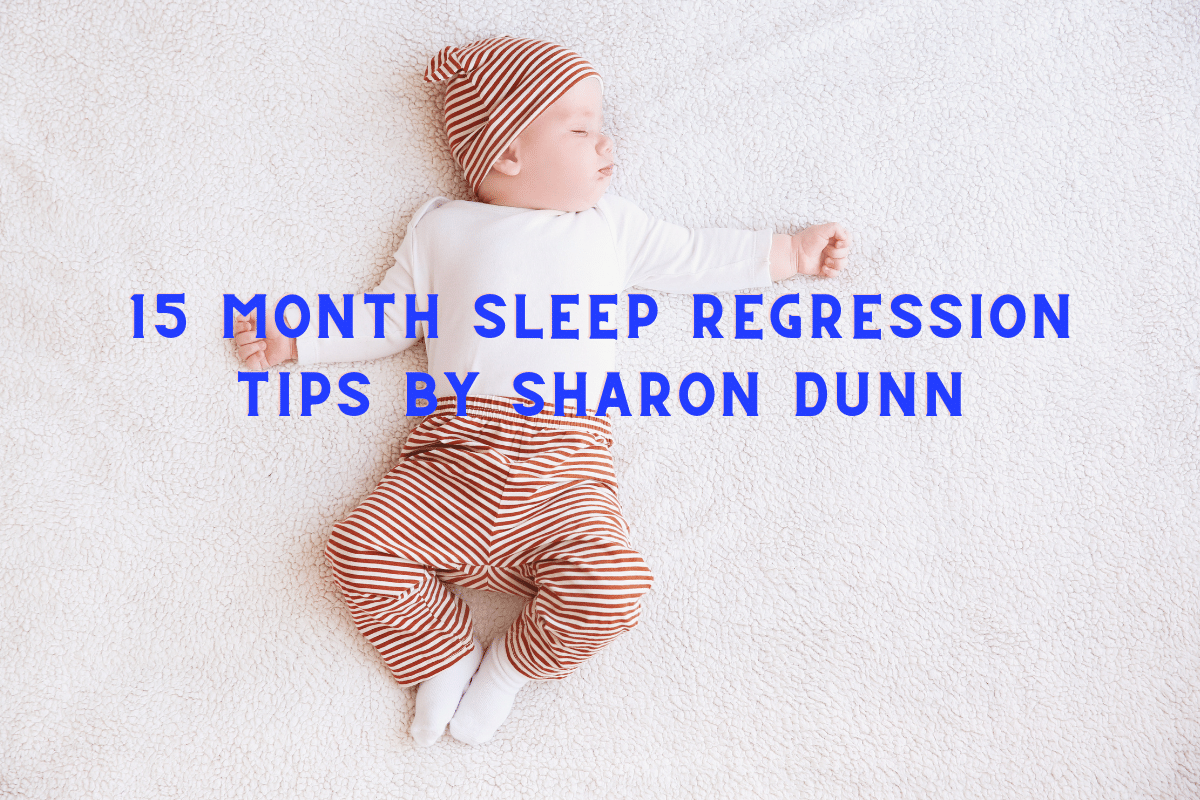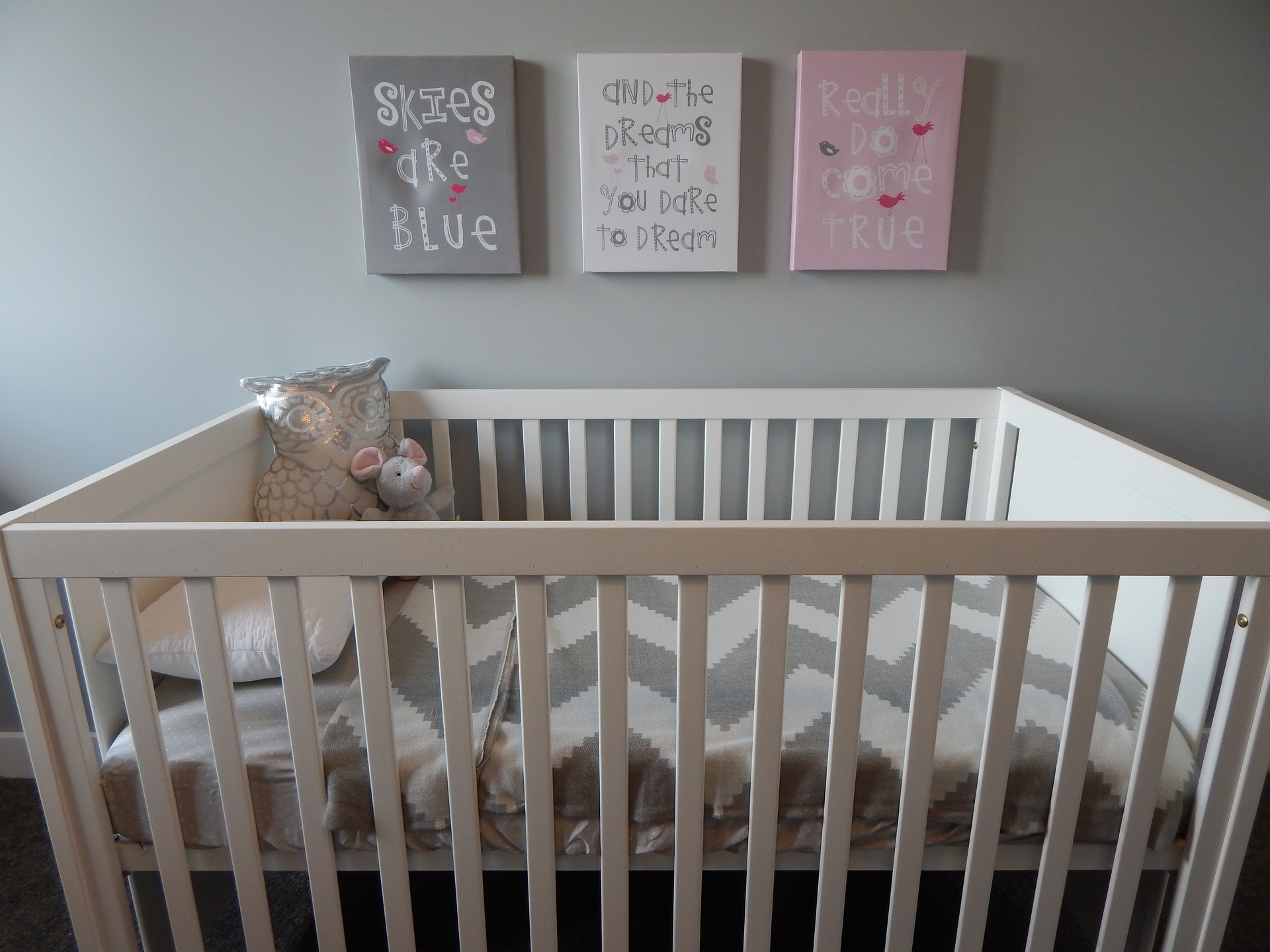If your 15-month toddler is giving you a series of all-nighters lately, it might be due to sleep regression. When my son Bobby was at this age he was a handful! So hopefully these tips and ideas will help with your child.
One of the main reasons for 15-month sleep regression is nap transition. Like in the 4-month, 6-month, or 8-month sleep regressions, the 15-month sleep regression introduces your baby to a new sleep pattern.
The toddlers reduce their sleep to one nap during the day and find it harder to resettle in their cribs once awake.
If your toddler has been irritating you with its sleep regression, let us help you through its nature, signs, causes, and how to handle this sleep phenomenon in children.
Table of Contents
- What Is 15-Month Sleep Regression?
- Top 6 Signs of 15 Month Sleep Regression in Your Toddler
- What’s Causing Your Toddler to Go through Sleep Regression?
- What Can You Do to Handle Sleep Regression in Your Child?
- Things You Can’t Do While Dealing with Sleep Regression in Your Child
- How to Deal with Separation Anxiety in Your Child?
- How Long Will 15 Month Sleep Regression Most Likely Last?
- When Should You Seek Medical Expertise?
- Sharon’s Final Words
What Is 15-Month Sleep Regression?
Simply put, when your baby is about 15 months old, it reaches another stage of sleep regression. At this stage, they start adapting to new activities like running, hopping, uttering words, or calling for attention.
These newly acquired habits and changes interact with their mind and body. Hence, babies wake up early while suffering a reduction in their natural sleep hours.
This might be stressful for the moms as they need to wake up to the cries of their babies in the middle of the night. But all the same, you need to be patient.
Please note that the time and signs of this sleep regression may vary from one kid to another. Some toddlers aged 12-15 months don’t even experience sleep regression.
However, if you’re already experiencing a few tantrums or after hour hyperactiveness in your baby, make sure of the 15-month sleep regression signs in your toddler.
Top 6 Signs of 15 Month Sleep Regression in Your Toddler
Your little one must be showing some telltale signs of sleep regression. You can’t miss it. It’s obvious how their sleep pattern alters radically when regressing in sleep.
Some common signs that you can expect are as follows:
- Cutting on Sleep
When in 15-month sleep regression, your toddler will constantly cut on sleep. It literally will come down to half of what they used to be even a couple of months ago.
You might be surprised how they’re actively moving around the house without getting the required portion of sleep. It’s like they’re trying to make up for the missing playtimes by staying up here and there within the 24-hour time slot.
- Breaking Sleep in Odd Hours through the Night
At this stage, you’ll feel like things have turned out to become totally disastrous. We won’t blame you because your cute little tot will wake up any time of the day— be it the dead of night, at the break of dawn, or even during the time when it used to have a sound sleep.
This drastic change in the sleep pattern is a big sign that your kid’s going through a 15-month sleep regression.
- Becoming Cranky and Irritable
Tears and more tears. Your toddler might develop an excessive crying habit at this stage. And you might not be able to calm your baby when it’s crying for no reason.
Sometimes, the baby will calm down on its own if you let it cry out its frustration for a while unless there’s any physical injury involved.
Don’t scold your baby since it’s not going to improve the condition.
Be patient, and check what’s bothering it apart from sleep regression. Is it its diaper that needs a change? Is the cloth comfortable? Is it hungry?
- Waking Up Consistently in the Middle of Nights
Be ready for countless sleepless nights because your toddler is going to give you some hard time sleeping during its 15-month sleep regression. Since their mind and body are going through some transitions, waking up at night seems to be a natural disposal of sleep.
They might wake up and wake you up as well to play with them. Sometimes, their hunger kicks them awake, or in some cases, they find it difficult to relax in their crib, hence breaking sleep.
- Losing Appetite
Another crucial sign to identify 15-month sleep regression is lack of appetite. Your kid will find food less interesting than his toys and everything around in the house.
It’s natural since their body is transitioning along with adding some new skills. And their digestive tract will take some hits as well, resulting in reduced appetite, crankiness, etc.
- Refusing to Go Back to Sleep
You’ll have a hard time making your baby go back to sleep once it’s awake at night. It’ll start looking for its toys or staring at the ceiling (probably wondering about its daytime adventures), cuddling with you, and so on.
The same can happen during its regular daytime sleep when your baby will keep itself busy with toys and stuff instead of napping or waking up within ten minutes after falling asleep.
What’s Causing Your Toddler to Go through Sleep Regression?
As you’re now aware of the signs of 15-month sleep regression, let’s find out what causes them to experience this sleep transition.
Below are seven causes behind a child’s 15-month sleep regression:
- Motor Skills Development
When your kid is about fifteen months old, their motor skills start running high. It learns to take small steps and then run. No wonder your toddler hates sleeping after attaining the freedom of loitering around the whole house by itself.
- Anxiety Due to Separation
As your kid grows up, especially during the twelve to fifteen months, it becomes more attached to you. So, when you leave him or her alone in its crib in sleep, it instinctively senses your absence; hence waking up without getting a full and fulfilling sleep.
- Teething, Cold, or Infection
Your toddler’s first molar is expected to root up from the gum by the time it’s about fifteen months old. And it’s severely painful for kids, which may not allow them to sleep peacefully.
Other reasons may include cold, ear infection, or fever which often interrupt sleep in children.
- Sleeping Less than Before
What you need to spot in your child is if it sleeps less during its regular daytime nap. Usually, toddlers take one nap instead of two at this stage. This change in the daytime sleep pattern may affect the night sleep pattern as well.
- Being Afraid of the Dark
Since your child’s mind is growing at this stage, it will start getting ideas. Hence, when you leave your curious tot alone in the dark in its crib, it might get scared of the moving shadows and silhouettes.
It’s one of the common reasons your toddler is finding it hard to fight those phantoms alone while trying to sleep.
- Trying to Communicate at Night
Apart from jumping and running around, your tot starts learning another skill; speaking. Even though the words are mostly limited to ‘mama,’ ‘papa,’ ‘rice,’ or ‘come here’ through mumbling, the enthusiasm remains on top of its head.
This new skill to your toddler is wondrous. You might dare stop him or her from talking, whether it’s morning, day, or night. You’ll mostly fail.
- Becoming More Active and Playful
With words, your toddler will also learn to command or express their wishes. Kids at this stage want to wear clothes and shoes on their own and grab their spoons while eating.
This sense of freedom allows them to be more active and playful, allowing very little rest and sleep.
What Can You Do to Handle Sleep Regression in Your Child?
You must be tolerant of your child’s 15-month sleep regression. Instead of becoming strict, you must practice the following to handle your kid’s 15-month sleep regression:
- Follow the Old Tricks
What do you think worked best for you to put your kid to sleep five to six months ago? Was it a particular sleeping time, lullaby, or simply some hugging?
Don’t ignore these old tricks as they can work sometimes effectively in handling your highly charged-up kid’s 15-month sleep regression.
- Install a Small Light
A small dim light in the corner of your toddler’s bedroom can make a significant difference. The light will prevent the child’s fear of darkness, putting it to sleep comfortably.
- Allow Your Toddler to Go on with It
On some nights or days, you’ve got to let your toddler pass the day with less sleep if that’s his or her choice. Maybe when your baby hasn’t slept properly for a day, it’ll tend to have a sound sleep the next day.
- Try Sleep Training
You can try various popular sleep training for your ever-awake tot. You might have tried a few before during its 6-month or 8-month sleep regression.
But since the problem has recurred, it’s best to reschedule some sleep training for your kid.
- Prepare Sleep-Friendly Environment Ahead of Its Bedtime
Remove all distractions at least two hours before bedtime. Don’t feed anything that’s rich in high calories or protein before sleep.
You may also try playing games with your kid in the evening that involves less physical activity or excitement, making it prone to sleep eventually in due time.
Things You Can’t Do While Dealing with Sleep Regression in Your Child
Let’s check the three things you mustn’t do while your baby’s getting sleep regression condition:
- Don’t Leave Him or Her Alone
Some parents leave their babies to themselves in their bedrooms while dealing with 15-month sleep regression.
Your kid may trip over its crib out of desperation and hit the floor in an attempt to get to you.
You may try attaching a safety crib net to prevent such accidents.
- Don’t Bring Your Little One to Your Bed
Don’t bring your kid to your bed if it’s not sleeping. Your kid may not fall asleep as he or she may not be used to a much bigger bed. You may try it, but you’ll most probably fail.
- Don’t Be Mad
Don’t wrestle your kid to sleep if it’s reluctant to. It’s understandable that you might get mad sometimes in such situations, but forcing your kid will only worsen the condition.
How to Deal with Separation Anxiety in Your Child?
You can try a few things to get your little one out of its separation anxiety while cruising through the 15-month sleep regression:
- Try some pre-bedtime games where you’ll be playing with your baby. It helps them relax before sleep.
- Since they understand communication now a little, tell your toddler that you’re returning soon to him or her while leaving it in the crib.
- Share a positive vibe with your kid while putting it to sleep like smiling, humming a song, etc.
How Long Will 15 Month Sleep Regression Most Likely Last?
Don’t get into depression if you’re dealing with 15-month sleep regression in your kid. It’s a natural transition, and it will get over within a little over a month.
The timeline may vary for different kids. However, hold on to your kid as long as it takes. Let this transition period in your kid end on a positive note.
When Should You Seek Medical Expertise?
If you’re failing to get your head around your kid’s fifteen month sleep regression, call a doctor. An expert medical check-up will figure out the actual problem that’s bothering your toddler.
The pediatrician will look for other signs like breathing difficulty, nightmares, etc., to determine the sleep interruption cause and appropriate treatment.
Sharon’s Final Words
So, that’s our attempt to enlighten you about 15-month sleep regression. We hope you’ll find it helpful if your toddler is driving you crazy with its sleep transition lately.
Eventually, a word of advice. Don’t get frustrated. Even if you do, get over it as soon as possible. Your irritation may share a negative vibe with your kid while it’s only trying to adapt to its natural transformation.
And always keep your pediatrician one call away to attend to any out-of-hand situations. Error on the side of caution.
Sharon C Dunn











